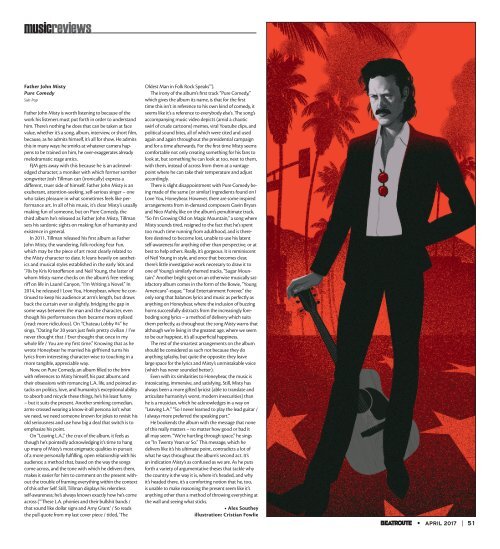BeatRoute Magazine AB print e-edition - April 2017
BeatRoute Magazine is a monthly arts and entertainment paper with a predominant focus on music – local, independent or otherwise. The paper started in June 2004 and continues to provide a healthy dose of perversity while exercising rock ‘n’ roll ethics. Currently BeatRoute’s AB edition is distributed in Calgary, Edmonton (by S*A*R*G*E), Banff and Canmore. The BC edition is distributed in Vancouver, Victoria and Nanaimo.
BeatRoute Magazine is a monthly arts and entertainment paper with a predominant focus on music – local, independent or otherwise. The paper started in June 2004 and continues to provide a healthy dose of perversity while exercising rock ‘n’ roll ethics.
Currently BeatRoute’s AB edition is distributed in Calgary, Edmonton (by S*A*R*G*E), Banff and Canmore. The BC edition is distributed in Vancouver, Victoria and Nanaimo.
Create successful ePaper yourself
Turn your PDF publications into a flip-book with our unique Google optimized e-Paper software.
musicreviews<br />
Father John Misty<br />
Pure Comedy<br />
Sub Pop<br />
Father John Misty is worth listening to because of the<br />
work his listeners must put forth in order to understand<br />
him. There’s nothing he does that can be taken at face<br />
value, whether it’s a song, album, interview, or short film,<br />
because, as he admits himself, it’s all for show. He admits<br />
this in many ways: he smirks at whatever camera happens<br />
to be trained on him, he over-exaggerates already<br />
melodramatic stage antics.<br />
FJM gets away with this because he is an acknowledged<br />
character; a moniker with which former somber<br />
songwriter Josh Tillman can (ironically) express a<br />
different, truer side of himself. Father John Misty is an<br />
exuberant, attention-seeking, self-serious singer – one<br />
who takes pleasure in what sometimes feels like performance<br />
art. In all of his music, it’s clear Misty’s usually<br />
making fun of someone, but on Pure Comedy, the<br />
third album he’s released as Father John Misty, Tillman<br />
sets his sardonic sights on making fun of humanity and<br />
existence in general.<br />
In 2011, Tillman released his first album as Father<br />
John Misty, the wandering, folk-rocking Fear Fun,<br />
which may be the piece of art most clearly related to<br />
the Misty character to date. It leans heavily on aesthetics<br />
and musical styles established in the early ‘60s and<br />
‘70s by Kris Kristofferson and Neil Young, the latter of<br />
whom Misty name checks on the album’s free-reeling<br />
riff on life in Laurel Canyon, “I’m Writing a Novel.” In<br />
2014, he released I Love You, Honeybear, where he continued<br />
to keep his audience at arm’s length, but draws<br />
back the curtain ever so slightly, bridging the gap in<br />
some ways between the man and the character, even<br />
though his performances then became more stylized<br />
(read: more ridiculous). On “Chateau Lobby #4” he<br />
sings, “Dating for 20 years just feels pretty civilian / I’ve<br />
never thought that / Ever thought that once in my<br />
whole life / You are my first time.” Knowing that as he<br />
wrote Honeybear he married his girlfriend turns his<br />
lyrics from interesting character-wise to touching in a<br />
more tangible, appreciable way.<br />
Now, on Pure Comedy, an album filled to the brim<br />
with references to Misty himself, his past albums and<br />
their obsessions with romancing L.A. life, and pointed attacks<br />
on politics, love, and humanity’s exceptional ability<br />
to absorb and recycle these things, he’s his least funny<br />
– but it suits the present. Another smirking comedian,<br />
arms-crossed wearing a know-it-all persona isn’t what<br />
we need, we need someone known for jokes to revisit his<br />
old seriousness and use how big a deal that switch is to<br />
emphasize his point.<br />
On “Leaving L.A.,” the crux of the album, it feels as<br />
though he’s pointedly acknowledging it’s time to hang<br />
up many of Misty’s most enigmatic qualities in pursuit<br />
of a more personally fulfilling, open relationship with his<br />
audience; a method that, based on the way the songs<br />
come across, and the tone with which he delivers them,<br />
makes it easier for him to comment on the present without<br />
the trouble of framing everything within the context<br />
of this other Self. Still, Tillman displays his relentless<br />
self-awareness; he’s always known exactly how he’s come<br />
across (“‘These L.A. phonies and their bullshit bands /<br />
that sound like dollar signs and Amy Grant’ / So reads<br />
the pull quote from my last cover piece / titled, ‘The<br />
Oldest Man in Folk Rock Speaks’”).<br />
The irony of the album’s first track “Pure Comedy,”<br />
which gives the album its name, is that for the first<br />
time this isn’t in reference to his own kind of comedy, it<br />
seems like it’s a reference to everybody else’s. The song’s<br />
accompanying music video depicts (amid a chaotic<br />
swirl of crude cartoons) memes, viral Youtube clips, and<br />
political sound bites, all of which were cited and used<br />
again and again throughout the presidential campaign<br />
and for a time afterwards. For the first time Misty seems<br />
comfortable not only creating something for his fans to<br />
look at, but something he can look at too, next to them,<br />
with them, instead of across from them at a vantage<br />
point where he can take their temperature and adjust<br />
accordingly.<br />
There is slight disappointment with Pure Comedy being<br />
made of the same (or similar) ingredients found on I<br />
Love You, Honeybear. However, there are some inspired<br />
arrangements from in-demand composers Gavin Bryars<br />
and Nico Muhly, like on the album’s penultimate track,<br />
“So I’m Growing Old on Magic Mountain,” a song where<br />
Misty sounds tired, resigned to the fact that he’s spent<br />
too much time running from adulthood, and is therefore<br />
destined to become lost, unable to use his latent<br />
self-awareness for anything other than perspective, or at<br />
best to help others. Really, it’s gorgeous. It is reminiscent<br />
of Neil Young in style, and once that becomes clear,<br />
there’s little investigative work necessary to draw it to<br />
one of Young’s similarly themed tracks, “Sugar Mountain.”<br />
Another bright spot on an otherwise musically satisfactory<br />
album comes in the form of the Bowie, “Young<br />
Americans”-esque, “Total Entertainment Forever,” the<br />
only song that balances lyrics and music as perfectly as<br />
anything on Honeybear, where the inclusion of buzzing<br />
horns successfully distracts from the increasingly foreboding<br />
song lyrics – a method of delivery which suits<br />
them perfectly, as throughout the song Misty warns that<br />
although we’re living in the greatest age, where we seem<br />
to be our happiest, it’s all superficial happiness.<br />
The rest of the smartest arrangements on the album<br />
should be considered as such not because they do<br />
anything splashy, but quite the opposite: they leave<br />
large space for the lyrics and Misty’s unmistakable voice<br />
(which has never sounded better).<br />
Even with its similarities to Honeybear, the music is<br />
intoxicating, immersive, and satisfying. Still, Misty has<br />
always been a more gifted lyricist (able to translate and<br />
articulate humanity’s worst, modern insecurities) than<br />
he is a musician, which he acknowledges in a way on<br />
“Leaving L.A.” “So I never learned to play the lead guitar /<br />
I always more preferred the speaking part.”<br />
He bookends the album with the message that none<br />
of this really matters – no matter how good or bad it<br />
all may seem. “We’re hurtling through space,” he sings<br />
on “In Twenty Years or So.” This message, which he<br />
delivers like it’s his ultimate point, contradicts a lot of<br />
what he says throughout the album’s second act. It’s<br />
an indication Misty’s as confused as we are. As he puts<br />
forth a variety of argumentative theses that tackle why<br />
the country is the way it is, where it’s headed, and why<br />
it’s headed there, it’s a comforting notion that he, too,<br />
is unable to make reasoning the present seem like it’s<br />
anything other than a method of throwing everything at<br />
the wall and seeing what sticks.<br />
• Alex Southey<br />
illustration: Cristian Fowlie<br />
BEATROUTE • APRIL <strong>2017</strong> | 51


















